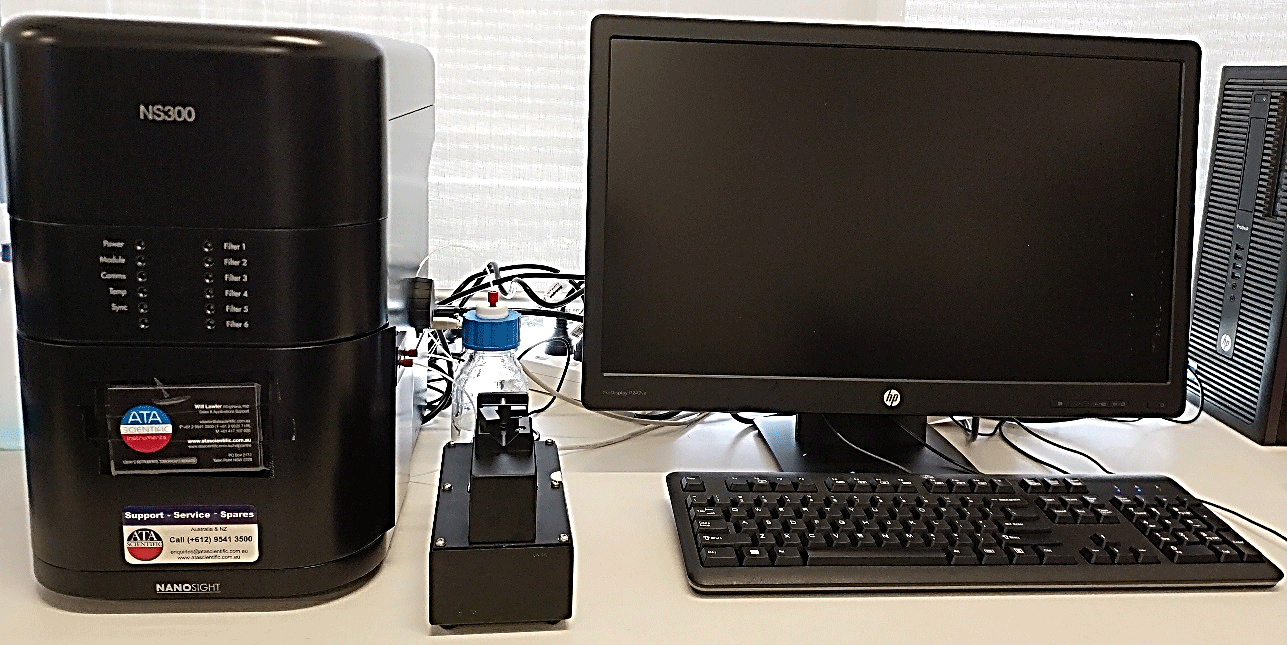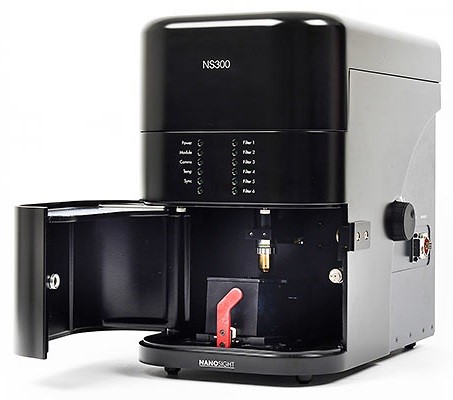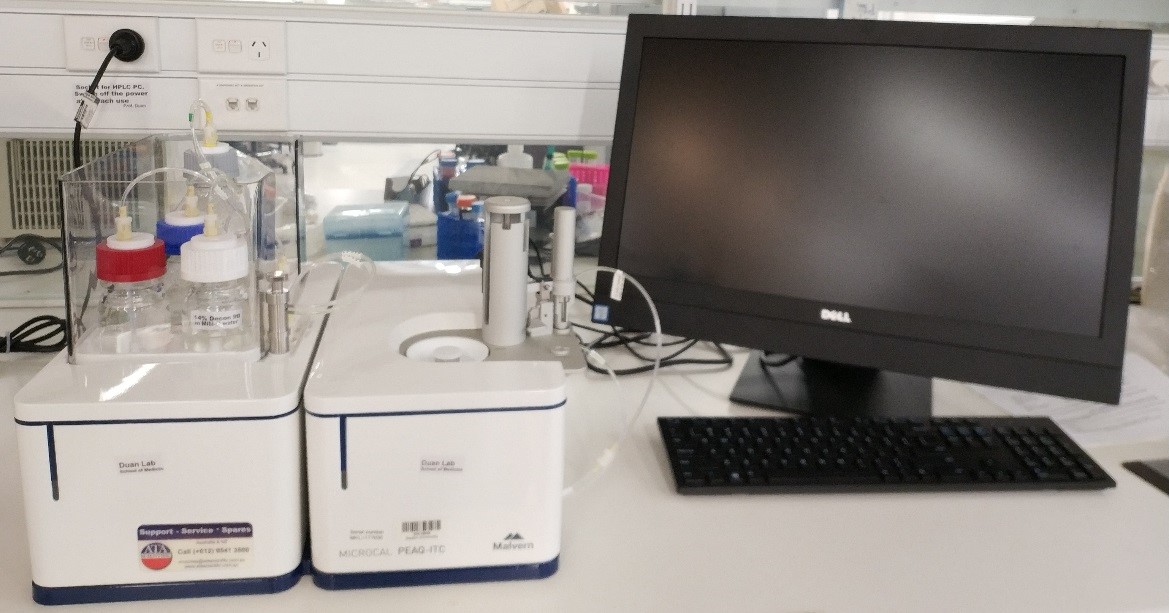Biophysics facility
NanoSight NS300
NanoSight NS300 utilises the particle characterisation technology, Nanoparticle Tracking Analysis (NTA), to visualise and measure particles in suspension (aqueous solution only) in terms of size, light scattering intensity, fluorescence and count. NTA is a video-based analysis for particles between 20-2000 nm* (*material dependent). Its applications includes protein aggregation, exosome and microvesicle research, and drug delivery systems.
MicroCal PEAQ (Isothermal Titration Calorimeter – ITC)
This is the gold standard technique to study label-free biomolecular interactions in-solution and is a thermodynamic technique that directly measures the heat released or absorbed during a biomolecular binding event. It enables the accurate determination of binding constants (KD), reaction stoichiometry (n), enthalpy (ΔH) and entropy (ΔS). This provides a complete thermodynamic profile of the molecular interaction. The sample size for binder (e.g. proteins) is 300 ml and the minimum requirement for the concentration of binder is 1 mM while that for the ligand is 10 mM.Both NanoSight and MicroCal PEAQ ITC are available to all School of Medicine, internal Deakin University researchers, as well as external scientists from other research facilities.
No training of these instruments will be provided. Samples will be run by members of Prof. Wei Duan’s Lab.
To gain access to these instruments, please provide a copy of standard operating procedure (SOP) and complete the application form below. This is to ensure that the experimental condition (eg. buffer used, nanoparticle waste management, etc.) is suitable and would not damage the instruments, and comply with regulatory requirements. Once the SOP is approved, your booking can be made.
Download the application form (PDF, 32.2KB)
Standard operating procedure
Occupational health and safety
NanoSight NS300 (Nanoparticle Tracking Analysis) (KA4.308)


NanoSight NS300 utilize Nanoparticle Tracking Analysis (NTA) to characterize nanoparticles from 10nm - 2000 nm*(*dependent on material) in solution. Each particle is individually but simultaneously analysed by direct observations of diffusion. This particle-by-particle methodology produces high resolution results for particle size distribution and concentration while visual validation gives users extra confidence in the data. As well as particle size and concentration,protein aggregation and viscosity can all be analysed, while a fluorescence mode provides detection of labelled particles.
The NanoSight NS300 system uses a 405 nm (violet) laser source to excite suitable fluorophores whose fluorescence can then be determined using long-pass 430 nm emission filter.
| Key benefits |
|
|---|---|
| Applications |
|
| Key specifications |
|
Learn more about the NanoSight NS300
MicroCal PEAQ (Isothermal Titration Calorimeter; ITC) (KA4.307)

| Key benefits |
|
|---|---|
| Applications |
|
| Key specifications |
|
| Analysis software |
|
| User | NanoSight NS300 | MicroCal PEAQ ITC |
|---|---|---|
| Duan lab | $5 | $4 |
| School of Medicine | $15 | $15 |
| Deakin Uni | $30 | $30 |
| External | $45 | $45 |
Booking policy
All bookings are to be made online using Outlook Calendar and are subjected to management approval. Minimum booking is 1 hour, followed by 30 minute increments thereafter.
*G HEALTH Medicine Lab Eqpmt ka 4.308 Nanosight300
*G HEALTH Medicine Lab Eqpmt ka 4.307 MicroCalPEAQITC
Charging starts from the time booked, so it is in your interest to arrive on time.
Cancellation policy
Cancellations can be made via the online booking system with between 24-48 hours’ notice.
Cancellations with less than 24 hours’ notice will be charged 50% of the booked time and no-shows will be charged in full.
NanoSight NS300
Malvern NanoSight NS300 Training Videos
- Nanoparticle Tracking Analysis - Nanosight NS300 Product Overview
- NanoSight General Characterisation Introduction
Literatures
- NanoSight NS300 Brochure
- Sizing and phenotyping of cellular vesicles using Nanoparticle Tracking Analysis
- Exosomal microRNAs (exomiRs): Small molecules with a big role in cancer
- Particle size distribution of exosomes and microvesicles
- Measurement of Nanoparticles and Protein Aggregates
MicroCal PEAQ-ITC
Malvern ITC Training Videos
- MicroCal PEAQ-ITC: The gold standard for measuring binding affinities
- Principles of isothermal titration calorimetry (ITC)
- MicroCal PEAQ-ITC - Loading a Sample
- MicroCal PEAQ-ITC - How to clean the system
- MicroCal PEAQ-ITC - How to change the plunger tip
- MicroCal PEAQ-ITC - How to manually clean the syringe
- MicroCal PEAQ-ITC - How to replacing the syringe
Literatures
- MicroCal PEAQ-ITC Brochure
- Analysis of Macromolecular Interactions by ITC
- ITC Review
- ITC Tutorial
- Introduction to Microcalorimetry Malvern
- ITC PEAQ DSC presentation April 2016_ATA
- Methods for measuring aptamer-protein equilibria: A review
- Methods for measuring small molecule-aptamer interaction ITC
- ITC Introduction Review 2010
- Characterization of biding interactions by ITC Review 1998
- Analysis of multiple-site binding of aptamer using ITC 2016
